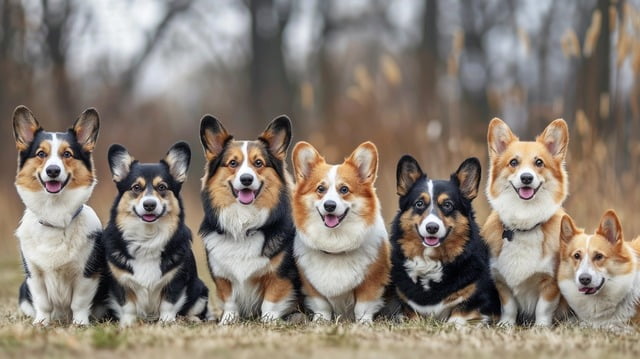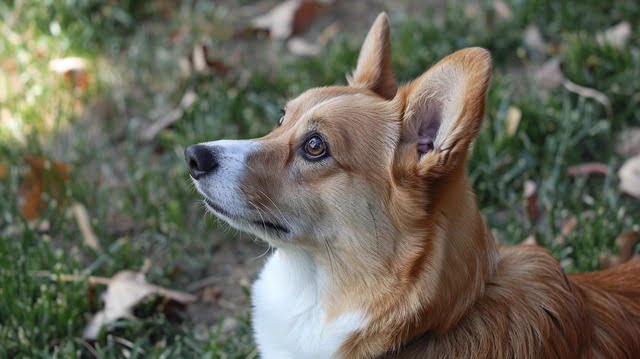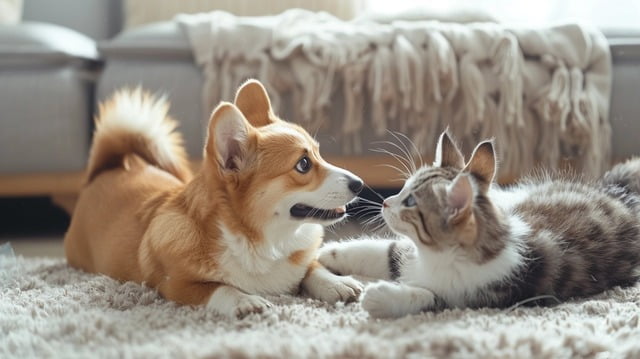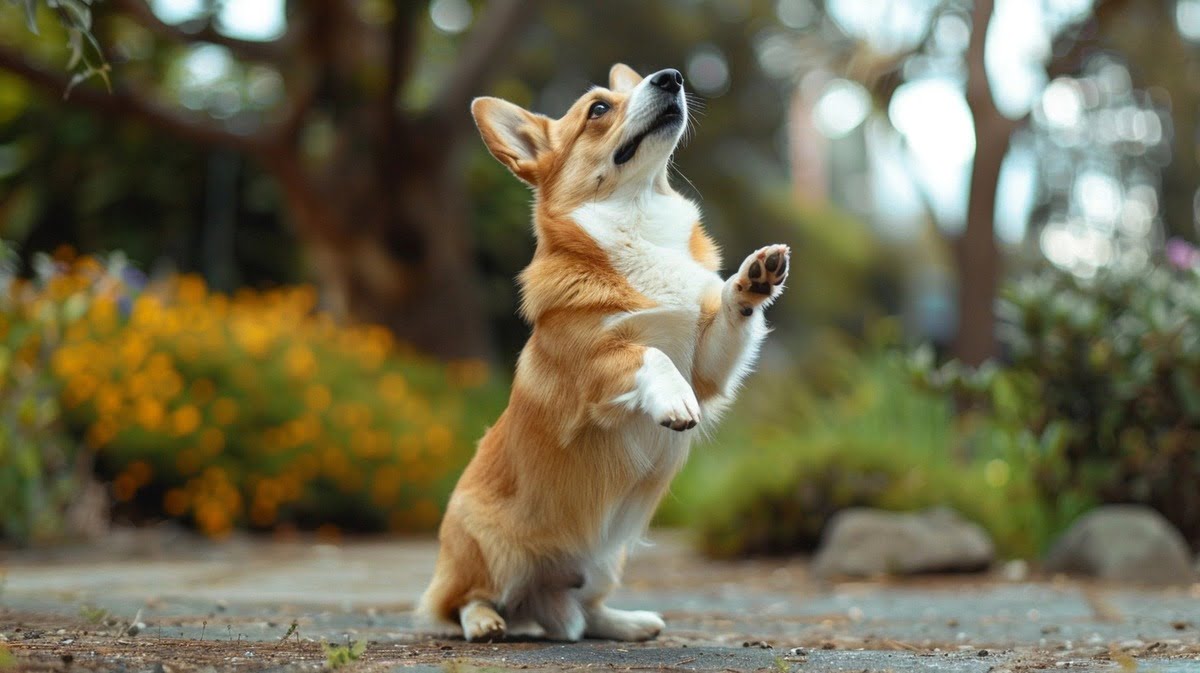Hey dog lovers, have you ever seen a dog so cute you just want to scoop it up and squeeze it? That’s probably how you feel about Pembroke Welsh Corgis! These adorable little pups are known for their short legs, long bodies, and big personalities. But there’s so much more to these furry friends than their charming appearance.
Pembroke Welsh Corgis have a rich history and are surprisingly versatile dogs. They’re not just cute couch potatoes – they’re also intelligent, loyal, and active companions. Whether you’re an experienced dog owner or a first-time pet parent, a Pembroke Welsh Corgi could be the perfect addition to your family.
So, what makes these dogs so special? Let’s dive in and discover the fascinating world of Pembroke Welsh Corgis!
History: A Legacy of Welsh Charm
Pembroke Welsh Corgis have a history as rich and captivating as their personalities. Hailing from the picturesque land of Wales, these little herding dogs have been beloved companions for centuries. Legend has it that these charming pups were gifts from fairies, who used them to pull their carriages and herd cattle. While we might not believe in fairies , there’s no denying the magical charm of these dogs.
Corgis were bred to be hardworking herders, using their low-slung bodies and surprising agility to nip at the heels of cattle and sheep. Their short legs kept them safe from kicks, and their fearless nature made them invaluable to farmers. Despite their small size, Corgis are incredibly brave and tenacious, making them excellent protectors of livestock.
The Pembroke Welsh Corgi and the Cardigan Welsh Corgi were originally considered one breed, simply known as Welsh Corgis. However, in the early 20th century, breeders recognized distinct differences between the two types, leading to their recognition as separate breeds in 1934. The Pembroke, with its docked tail and fox-like face, quickly became a favorite among dog enthusiasts.
Royal Recognition
The Pembroke Welsh Corgi’s popularity soared to new heights when Queen Elizabeth II of England fell in love with the breed. She received her first Corgi, Susan, as a gift on her 18th birthday, and the rest is history. The Queen’s love for Corgis has spanned decades, and these adorable dogs have become synonymous with the British Royal Family.
But don’t let their royal connections fool you – Pembroke Welsh Corgis are more than just pampered pooches. They’re intelligent, adaptable, and eager to please, making them wonderful pets for families and individuals alike. Their herding instincts may still be strong, so don’t be surprised if your Corgi tries to “herd” you or your children!
Appearance: Big Dog in a Small Package

There’s no mistaking a Pembroke Welsh Corgi! These charming pups have a distinctive look that’s both adorable and athletic. Imagine a furry loaf of bread with short, sturdy legs and a big, bushy tail (or a “fluff butt,” as some Corgi fans affectionately call it). That’s the Pembroke Welsh Corgi in a nutshell!
Let’s break down their unique features:
- Size: Corgis are considered a small to medium breed, typically standing about 10 to 12 inches tall at the shoulder and weighing between 25 and 30 pounds.
- Body: Their bodies are long and low to the ground, with a deep chest and a strong back. This build makes them surprisingly agile and fast, despite their short legs.
- Legs: Their short, stubby legs are one of their most iconic features. While they might not be built for sprinting, these legs give Corgis a low center of gravity, making themincredibly stable and balanced.
- Head: Corgis have a broad, fox-like head with large, erect ears. Their expressive eyes are full of intelligence and mischief, and their smiles are simply irresistible!
- Coat: They have a thick double coat that comes in various colors, including red, sable, fawn, black and tan, and sometimes with white markings. This dense coat helps protect them from the elements, but it also means they shed quite a bit.
A Rainbow of Corgis

Not all Pembroke Welsh Corgis look exactly alike. They come in a variety of coat colors and markings, adding to their unique charm. Some of the most common colors include:
- Red: A vibrant, reddish-brown color that can range from light to dark.
- Sable: A mix of red, black, and gray hairs that create a beautiful, multi-toned effect.
- Fawn: A light, yellowish-brown color that’s often seen with black tips on the hairs.
- Black and Tan: A classic combination of black and tan markings, usually with tan eyebrows and a tan “mask” around the face.
While these are the most common colors, you might also find Corgis with brindle (striped) or blue merle (mottled) coats. And no matter what color their coat is, Corgis always have those adorable short legs and expressive eyes that make them so irresistible.
Temperament: Big Personality in a Small Dog

Don’t let their short legs fool you – Pembroke Welsh Corgis have personalities as big as their hearts! These dogs are known for their intelligence, loyalty, and playful nature. They’re always up for an adventure, whether it’s a walk in the park, a game of fetch, or a cuddle session on the couch.
Corgi Quirks and Charms
One of the most endearing qualities of Corgis is their sense of humor. They’re often described as mischievous and playful, with a knack for getting into (and out of) trouble. They love to make their humans laugh, whether it’s with their silly antics or their adorable “sploot” position (lying flat on their belly with legs outstretched).
Corgis are also incredibly intelligent and eager to please, which makes them relatively easy to train. However, they can be a bit stubborn at times, so patience and positive reinforcement are key. With consistent training and plenty of love, your Corgi will quickly become a well-behaved and obedient companion.
Herding Instincts: More Than Just a Quirk

As herding dogs, Pembroke Welsh Corgis have a natural instinct to round up and control livestock. This instinct can manifest in various ways, even if your Corgi has never seen a sheep or cow in its life. You might notice your Corgi trying to “herd” you, your children, or even other pets by gently nipping at their heels or barking to get them moving.
While this behavior can be amusing, it’s important to manage it with proper training. Teaching your Corgi basic commands like “leave it” and “stay” can help redirect their herding instincts and prevent them from becoming overly bossy.
Watchdogs with a Bark
Corgis are also known for their vocal nature. They have a surprisingly loud bark for such a small dog, which makes them excellent watchdogs. They’re quick to alert you to anything out of the ordinary, whether it’s a squirrel in the backyard or a stranger at the door.
While their barking can be helpful, it’s important to teach your Corgi to bark appropriately. Excessive barking can become a nuisance, so training them to quiet down on command is essential.
The Perfect Companion for Active Lifestyles
Pembroke Welsh Corgis are not just lapdogs – they’re active and energetic companions who thrive on exercise and mental stimulation. They love to play fetch, go for walks, and participate in dog sports like agility and herding trials.
Care: Keeping Your Corgi Happy and Healthy
Caring for a Pembroke Welsh Corgi is a rewarding experience, but it does require some attention to detail. These active and intelligent dogs have specific needs that must be met to ensure they live long, happy, and healthy lives.
Exercise: A Corgi on the Move
Don’t let those short legs fool you! Corgis are energetic dogs that need regular exercise to stay physically and mentally stimulated. Aim for at least 30-60 minutes of exercise per day, which can include walks, playtime in the yard, or even a fun game of fetch.
Remember, Corgis were bred for herding, so they have a natural instinct to be active. Regular exercise can help prevent boredom and destructive behaviors, such as excessive barking or chewing.
Grooming: Taming the Fluffy Butt
Corgis have thick, double coats that shed moderately throughout the year and heavily during shedding season. To keep their fur in tip-top shape and minimize shedding, brush them at least twice a week with a slicker brush or pin brush. During shedding season, you may need to brush them daily to keep the fur tumbleweeds at bay.
Bathing your Corgi every few months or as needed will help keep their coat clean and healthy. Be sure to use a gentle dog shampoo and conditioner to avoid irritating their skin.
Health: Keeping a Close Eye on Your Corgi
Like all dog breeds, Pembroke Welsh Corgis are prone to certain health issues. Some of the most common health concerns include:
- Hip Dysplasia: A condition where the hip joint doesn’t develop properly, leading to pain and arthritis.
- Intervertebral Disc Disease (IVDD): A condition where the discs in the spine degenerate, causing pain and neurological problems.
- Progressive Retinal Atrophy (PRA): A degenerative eye disease that can eventually lead to blindness.
- Epilepsy: A neurological disorder that causes seizures.
- Degenerative Myelopathy (DM): A progressive disease of the spinal cord that affects older dogs.
Regular checkups with your veterinarian can help identify and manage these potential health problems early on. It’s also important to choose a reputable breeder who screens their dogs for genetic conditions.
Feeding Your Corgi: A Balanced Diet for a Happy Pup
Corgis are known for their love of food, and they can easily become overweight if overfed. A balanced diet that’s appropriate for their age, activity level, and size is essential for their health and well-being. Feed your Corgi high-quality dog food that’s formulated for their specific needs, and avoid giving them too many treats.
Remember, a healthy Corgi is a happy Corgi! By providing your furry friend with proper care and attention, you can ensure they live a long, fulfilling life by your side.
Living with a Pembroke Welsh Corgi: Your New Best Friend

Life with a Pembroke Welsh Corgi is anything but dull! These little dogs bring a ton of joy and laughter to any household. They’re known for their affectionate nature and love to be involved in family activities. Whether you’re binge-watching your favorite show on the couch or going for a hike in the woods, your Corgi will be right by your side, eager to share in the fun.
Family Fun with a Corgi
Corgis are generally great with children, thanks to their playful and patient nature. They love to chase balls, play hide-and-seek, and even participate in silly dress-up games. However, it’s important to supervise interactions between young children and Corgis, as their herding instincts can sometimes lead to nipping at heels.
Teaching children how to interact with dogs respectfully is crucial for a harmonious relationship. With proper guidance, your Corgi and your kids can become the best of friends.
Choosing between a male or female Pembroke Welsh Corgi is a common dilemma for potential owners. While both genders share the breed’s lovable traits, subtle differences in temperament and behavior might influence your decision. Males are often described as more playful and outgoing, while females can be more independent and reserved. Some say males are easier to train, but others find females more eager to please. Ultimately, both make wonderful companions. The best choice depends on your lifestyle and the specific personality of the individual dog.
Corgis and Other Pets: A Harmonious Pack

Pembroke Welsh Corgis can get along well with other pets, especially if they’re raised together from a young age. Their herding instincts might kick in with smaller animals like cats or rabbits, but with proper socialization and training, they can learn to coexist peacefully.
Introducing your Corgi to other pets should be done gradually and under supervision. Positive reinforcement and rewards can help your Corgi associate other animals with good things, leading to a happy and harmonious household.
Corgi-Proofing Your Home: A Must for New Owners
Before bringing a Corgi into your home, it’s important to “Corgi-proof” your living space. These curious and clever dogs are known for getting into mischief, so be sure to:
- Secure trash cans and food storage: Corgis are notorious for counter-surfing and raiding the trash in search of snacks.
- Keep small objects out of reach: Corgis are prone to chewing, so keep small toys, shoes, and other tempting items out of their reach.
- Block off dangerous areas: Stairs and balconies can be hazardous for Corgis with their short legs and long backs, so use baby gates or other barriers to keep them safe.
The Joys of Corgi Ownership
Owning a Pembroke Welsh Corgi is a unique and rewarding experience. These dogs are full of personality, love, and loyalty. They’ll make you laugh, keep you active, and shower you with affection.
If you’re looking for a furry friend who will bring endless joy and companionship to your life, a Pembroke Welsh Corgi might be the perfect match for you.
Choosing a Pembroke Welsh Corgi Puppy: Finding Your Perfect Match
Bringing a Pembroke Welsh Corgi puppy into your home is a big decision, and it’s essential to choose the right breeder or rescue organization to ensure a happy and healthy start for your new furry friend. Here’s what you need to know
Researching Reputable Breeders
If you decide to go the breeder route, it’s crucial to research and choose a reputable breeder who prioritizes the health and well-being of their dogs. Here are some tips:
- Ask for references: Talk to other Corgi owners and get recommendations for breeders they trust.
- Visit the breeder’s facility: A good breeder will be happy to show you their facilities and introduce you to the parent dogs.
- Check for health clearances: Ask the breeder for proof of health clearances for the parent dogs, which can help identify potential genetic conditions.
- Meet the puppies: Spend time with the puppies to get a sense of their personalities and temperaments.
Adopting from a Rescue or Shelter
Adopting a Corgi from a rescue or shelter is a wonderful way to give a dog in need a loving home. While you might not get a puppy, many adult Corgis are available for adoption, and they can make fantastic companions.
When considering adoption, visit the shelter or rescue organization and spend time with the dogs available. Ask about their history, temperament, and any special needs they might have. The staff can help you find a Corgi that’s a good fit for your lifestyle and personality.
What to Look for in a Corgi Puppy
Whether you’re buying from a breeder or adopting from a shelter, there are some key things to look for in a healthy Corgi puppy:
- Bright eyes and a clean nose: These are signs of good overall health.
- Shiny coat: A healthy coat indicates good nutrition and grooming.
- Playful and energetic: Puppies should be active and curious, not lethargic or withdrawn.
- Good appetite: A healthy puppy will eat well and show interest in food.
- Clean ears and teeth: These are signs of good hygiene and can help prevent future health problems.
Bringing Your Puppy Home: The First Few Days
The first few days with your new Corgi puppy are crucial for bonding and establishing a routine. Create a safe and comfortable space for your puppy, with a cozy bed, food and water bowls, and plenty of toys.
Start with basic obedience training, such as house training and teaching your puppy their name. Positive reinforcement with treats and praise can go a long way in establishing good behavior from the start.
Remember, patience and love are key to raising a happy and well-adjusted Corgi puppy. With proper care and attention, your new furry friend will bring years of joy and companionship to your life.
Cost of Pembroke Welsh Corgi Puppies: Investing in a Furry Friend
Bringing a Pembroke Welsh Corgi puppy into your life is a decision that comes with both excitement and financial considerations. The initial purchase or adoption fee is just the beginning of your investment in this adorable breed. Expect to budget for high-quality dog food, which can run around $30 to $50 per month, as well as regular veterinary care for checkups, vaccinations, and preventive medications. Grooming is another factor, with costs varying depending on whether you choose professional grooming or DIY brushing and bathing. Training, while not mandatory, can be beneficial for managing their herding instincts and excessive barking, with costs varying based on the trainer’s experience. Don’t forget about supplies like leashes, collars, beds, toys, and bowls, which can add up depending on your preferences. While owning a Corgi involves financial commitment, the love, laughter, and companionship they bring are immeasurable rewards.
Conclusion
Well, friends, there you have it – a deep dive into the wonderful world of Pembroke Welsh Corgis. We’ve covered their history, their looks, their quirks, and everything you need to know about caring for these adorable pups.
Whether you’re charmed by their fairy-tale origins, their goofy grins, or their unwavering loyalty, there’s no denying that Corgis have a special place in the hearts of dog lovers everywhere. They’re not just pets, they’re family members, best friends, and sources of endless entertainment.
If you’re considering adding a Corgi to your crew, remember that it’s a decision that shouldn’t be taken lightly. These dogs require time, attention, and commitment, but the rewards are immeasurable. With their playful personalities, affectionate nature, and unwavering loyalty, Corgis will undoubtedly steal your heart and bring years of joy to your life.
So, what are you waiting for? If you’re ready to embrace the Corgi life, start your research, find a reputable breeder or rescue organization, and get ready to welcome a furry bundle of love into your home. And who knows, you might just find that a Corgi-shaped hole in your heart was exactly what you needed.
Frequently Asked Questions About Pembroke Welsh Corgis
Are Pembroke Welsh Corgis good with children and other pets?
Yes, they generally are! Corgis are known for their playful and patient nature, making them good companions for children. They can also get along well with other pets, especially if socialized early. However, it’s important to supervise interactions, as their herding instincts might lead to nipping at heels.
What’s the difference between Pembroke and Cardigan Welsh Corgis?
While both are adorable and intelligent herding dogs, there are a few key differences. Pembroke Corgis have docked tails and fox-like faces, while Cardigans have long tails and rounded ears. Their temperaments are slightly different too, with Pembrokes often being more outgoing and energetic.
Do Pembroke Welsh Corgis make good apartment dogs?
Yes, they can! Despite their herding heritage, Corgis can adapt well to apartment living as long as they receive enough exercise and mental stimulation. Daily walks, playtime, and puzzle toys can help keep them happy and healthy in smaller spaces.
What are some lesser-known health concerns Pembroke Welsh Corgi owners should be aware of?
While hip dysplasia and back problems are well-known, other concerns include Von Willebrand’s Disease (a bleeding disorder), lens luxation (eye issue), and certain types of cancer. Regular vet checkups and genetic testing can help catch these early.
Are Pembroke Welsh Corgis more prone to barking than other breeds?
Yes, they can be quite vocal! Corgis were bred to herd, and barking was a key communication tool. While this makes them excellent watchdogs, it’s important to train them to bark appropriately to avoid excessive noise.
Is it true Pembroke Welsh Corgis were bred for a specific type of herding?
Yes! They were primarily used for herding cattle. Their low stature helped them avoid kicks, and their agility allowed them to nip at heels effectively. This heritage explains their instinct to herd anything that moves, even if it’s just your kids!
What’s the best way to train a Pembroke Welsh Corgi with a strong herding instinct?
Positive reinforcement is key! Reward desired behaviors with treats and praise. Redirect their herding instincts into games like fetch or agility. Consistency and patience are crucial, as Corgis can be a bit stubborn.
Are there any unique grooming challenges with a Pembroke Welsh Corgi’s double coat?
Yes, their thick double coat sheds heavily, especially during shedding season. Regular brushing is essential to manage this. Additionally, the hair between their paw pads can become matted and trap debris, so it’s important to trim this regularly.
Can Pembroke Welsh Corgis participate in dog sports other than herding?
Absolutely! Corgis excel in various dog sports, including agility, obedience, rally, and even dock diving. Their intelligence, athleticism, and eagerness to please make them versatile competitors.
What’s the biggest misconception about Pembroke Welsh Corgis?
Many people underestimate their exercise needs due to their short legs. Corgis are active dogs that require daily physical and mental stimulation. Failing to meet these needs can lead to behavioral issues and health problems.

I could talk about dog breeds all day! My goal is to help you find the four-legged friend who fits your life like a perfectly worn-in tennis ball fits in a dog’s mouth.

